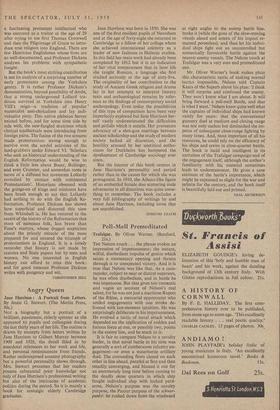Pell-Mell Premeditated
THE Nelson touch . . . the phrase evokes an impression of impetuousness; the instant, wilful, disobedient impulse of genius which seizes a momentary opening and thrusts through it to unexpected victory. And it is true that Nelson was like that. As a com- mander, subject to near or distant superiors, he was often disobedient, and in battle he was impetuous. But that gives too romantic and vague an account of Nelson's real talent, for he was not just a maritime Rupert of the Rhine, a mercurial opportunist who settled engagements with one stroke de- livered with last-moment intuition. He was surprisingly deliberate in his impetuousness. He evolved a tactic of naval attack which depended on the application of sudden and furious force at one, or possibly two, points in the enemy line, and he stuck to it.
It is fair to compare Nelson to a cavalry leader, in that naval battle in his time was generally a sort of cumbersome infantry en- gagement—or even a waterborne artillery duel. The contending fleets closed on each other in line ahead, parallel at first and then steadily converging, and blasted it out for an enormously long time before coming to the deadly dose quarters in which ship fought individual ship with locked yard- arms. Nelson's purpose was the cavalry purpose, the Panzer purpose of the schwer- punkt: he rushed down from the windward
at right angles to the enemy battle line, broke it (while the guns of the slow-moving vessels ahead and astern of his impact re- mained powerless), and then let his indivi- dual ships fight out an uncontrolled but numerically favourable battle against the nearest enemy vessels. The Nelson touch at Trafalgar was a very sure and premeditated one.
Mr. Oliver Warner's book makes plain this characteristic tactic of making normal tactics impossible. Nelson told Captain Keats of the Superb about his plan: 'I think it will surprise and confound the enemy. They won't know what I am about. It will bring forward a pell-mell Battle, and that is what I want.' Nelson knew quite well what the captains of individual ships had known vainly for years: that the conventional gunnery duel at medium and closing range was not only useless but diminished the im- petus of subsequent close-range fighting by many times. And, most important of all his resources, he could rely on the efficiency of his ships and crews in close-quarter battle. The book is lucid and intelligent in its narration of the Trafalgar campaign andof the engagement itself, although the author's familiarity with his material sometimes leads to understatement. He gives a sane estimate of the battle's importance, which might be expressed as slight for the war and infinite for the century, and the book itself is beautifully laid out and printed.
NEAL ASCHERSON






























 Previous page
Previous page